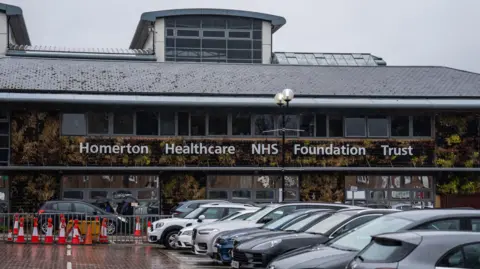Medics did not give antibiotics swiftly - inquest
 Family handout
Family handoutHospital medical staff failed to swiftly administer antibiotics to the son of one of the hospital's senior doctors - who was showing signs of sepsis - an inquest has heard.
William Hewes died aged 22 at Homerton University Hospital in east London in January 2023 within 24 hours of being admitted after his meningitis, caused by a meningococcal infection, developed into sepsis.
Mr Hewes, who was studying history and politics at university, was said to have been fit and healthy before the infection.
His inquest at Bow Coroner's Court heard evidence on Thursday from several medical staff who were on shift when the student died.
'Immediately concerned'
Deborah Burns, Mr Hewes's mother, is a consultant paediatrician at the Hackney hospital and has been a doctor there for more than 20 years.
According to the family's lawyers, they believe the hospital failed to ensure antibiotics were administered to Mr Hewes within an hour of his arrival, as per national guidelines, despite Dr Burns repeatedly raising the alarm that he needed them and had not received them.
The inquest heard Mr Hewes arrived at the hospital at 00:06 GMT, was admitted to its resuscitation area (resus) and received antibiotics at about 01:25.
Rebecca McMillan, who was the emergency medicine registrar that night, grew emotional as she told the coroner what she would have done differently, and said from the moment she saw Mr Hewes she believed he might die.
Dr McMillan said she became "immediately very concerned" about sepsis when she examined Mr Hewes.
She said she told nurses working in resus about the type and dose of antibiotics he needed but said: "I don't know that I was clear who I was directing my instruction to."
She left resus at 00:42 and told the court she would have expected the antibiotics to be administered within 10 minutes of her departure.
But at about 01:15 she realised Mr Hewes had not received the medicine.
"I do recall standing outside the resus room with [nurse Marianela Balatico] where she asked if I was OK and said that I looked really upset when I realised that antibiotics had not been given," Dr McMillan said.
"We had a conversation along the lines of we didn't understand how this had happened. We were both upset when we realised that this hadn't happened."
 Getty Images
Getty ImagesNeil Sheldon KC, representing Dr Burns, asked Dr McMillan whether it was "common practice" to issue a warning to "a room at large" that a patient needed antibiotics.
Struggling to get her words out, and looking up at the court ceiling, she replied: "Absolutely not... I want to believe that in other circumstances and in my normal practices that my communication would be clear."
She told the court she had a recollection of one of the nurses telling her they would be giving Mr Hewes antibiotics but that she could not recall who.
'An oversight'
Coroner Mary Hassell earlier relayed some of Ms Balatico's previous evidence to the court in which she explained she had not been told which antibiotics to give and concentrated on relieving Mr Hewes's symptoms.
"The antibiotics slipped my mind," the nurse said.
Luke Brown, senior charge nurse on the night in question, told the court on Thursday that he had "assumed" his team had given Mr Hewes antibiotics and he did not at any point ask them about whether they had administered the medicine.
"That was an oversight from me," he said.
The inquest heard he agreed that in a case of suspected sepsis, antibiotics should be administered as soon as possible and, in any case, at the latest within an hour.
The nurse told the court he trusted the team he left in charge, including Ms Balatico who was a band-five nurse, to escalate matters if they needed to, but added: "It is disappointing that they didn't speak to me on that night."
Asked if he heard Dr Burns repeatedly asking nursing staff whether they were giving her son antibiotics, and telling them that he needed them urgently, Mr Brown said: "No, I didn't hear that."
On what he has learned, he said: "In hindsight, I would have gone in there within 60 minutes to make sure that antibiotics had been given and just check in with the resuscitation team."
The inquest heard he agreed that he would now be more vigilant because of what had happened to Mr Hewes but also explained that he had had 60-80 other patients to look after on the night.
The inquest continues.
Listen to the best of BBC Radio London on Sounds and follow BBC London on Facebook, X and Instagram. Send your story ideas to [email protected]
